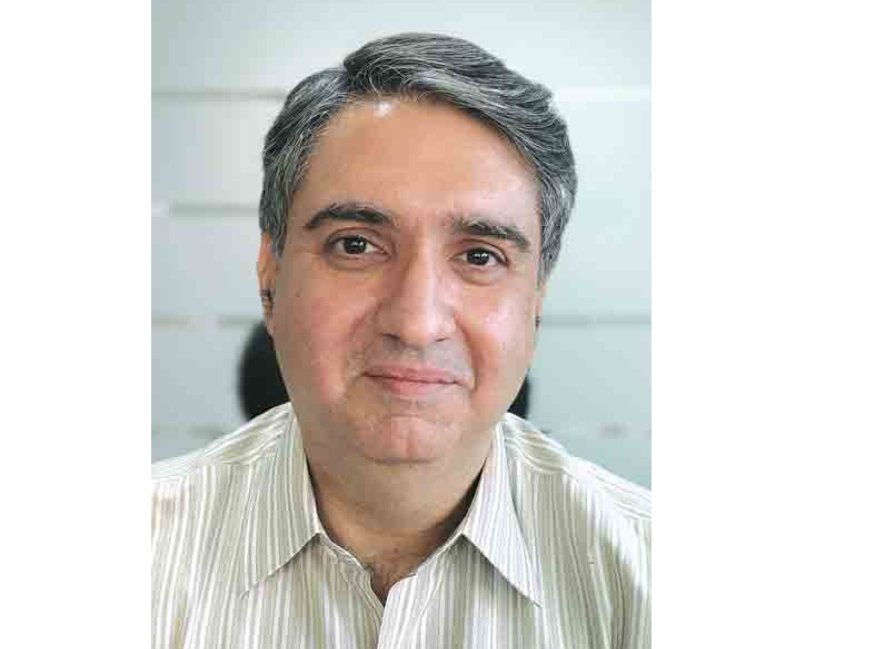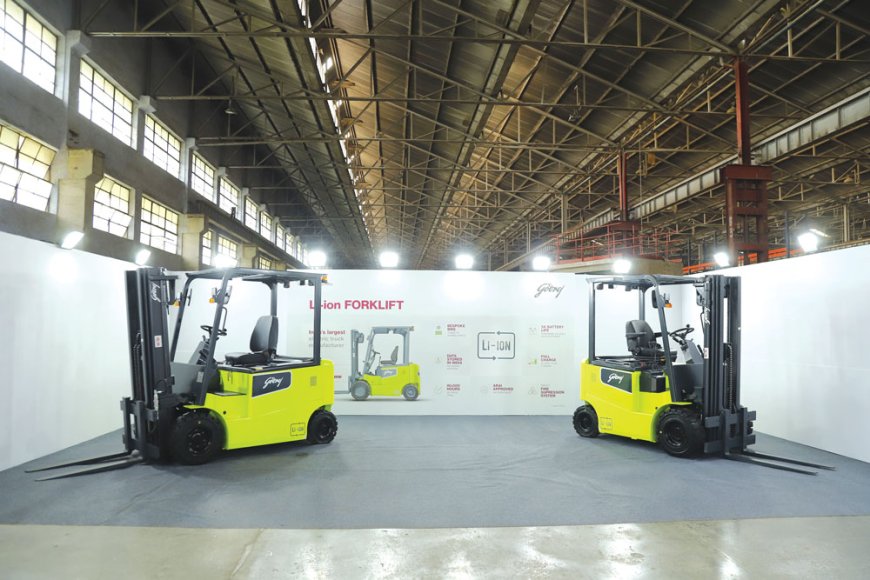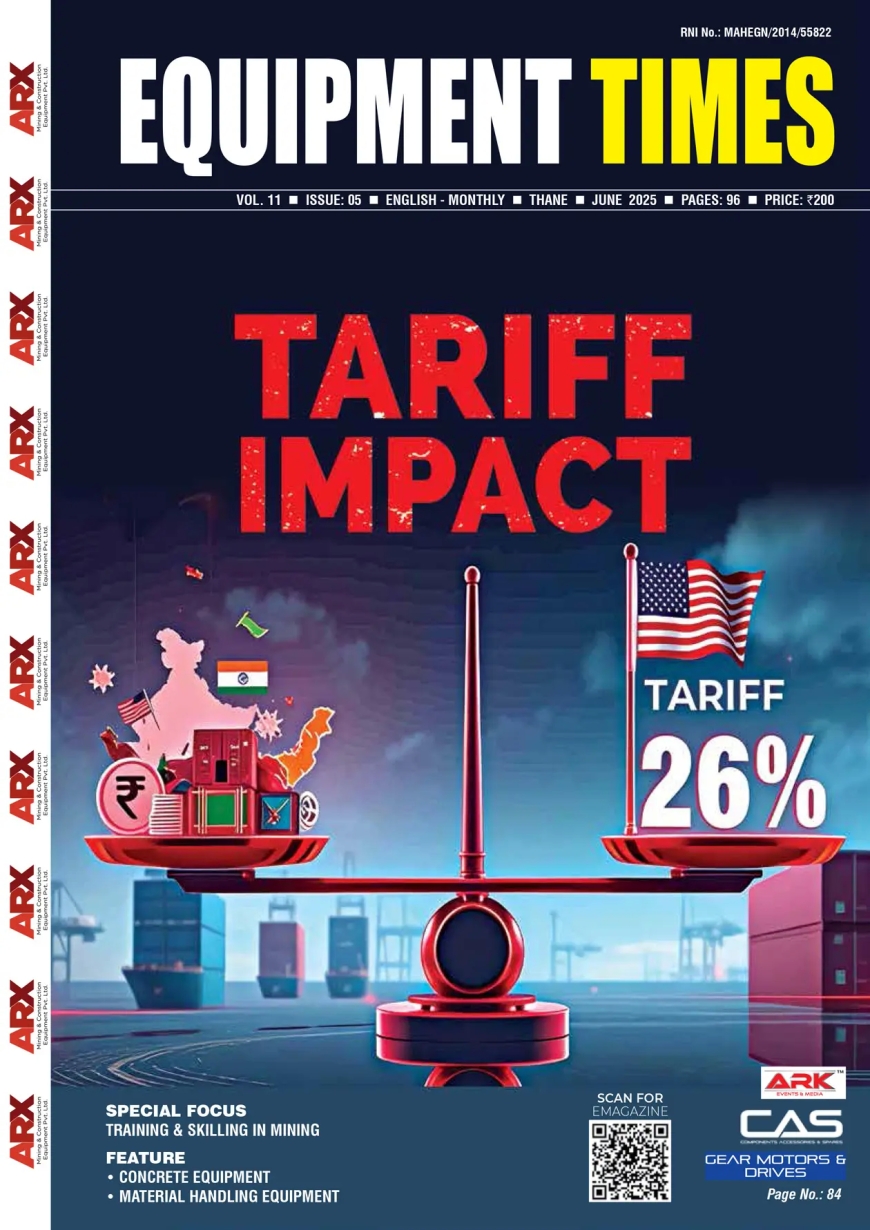Godrej’s commitment to sustainability shapes our manufacturing processes and informs our product development roadmap.
The material handling equipment market is undergoing significant transformation globally and in India. Key trends include automation integration with AI-powered solutions revolutionizing warehouse operations.

Neville Mevawala
Head of Sales & Marketing, Material Handling Equipment, a part of Godrej Enterprises Group
What are the current trends driving the material handling equipment market in India and globally?
The material handling equipment market is undergoing significant transformation globally and in India. Key trends include automation integration with AI-powered solutions revolutionizing warehouse operations, sustainable equipment designs focusing on electric, and IoT connectivity enabling predictive maintenance and real-time tracking capabilities.
E-commerce growth is accelerating technology adoption, while compact equipment designed for tight spaces is addressing urban warehousing challenges. The industry is also moving toward flexible, modular solutions that can adapt to changing business requirements.
At Material Handling Equipment business of Godrej Enterprises Group, we’re driving innovation through our comprehensive approach to equipment design and functionality. Our electric forklift range balances efficiency with performance requirements, addressing the market’s growing demand for sustainable solutions.
We continue to enhance our product portfolio with features that improve operator experience and workplace safety. Godrej’s commitment to sustainability shapes our manufacturing processes and informs our product development roadmap.
How is your company integrating automation, IoT, telematics, AI, and robotics into your machines?
We are set to launch India’s first IoT-enabled forklift trucks, empowering fleet owners to monitor equipment performance across multiple locations and optimize fleet utilization and maintenance costs through proactive, data-driven interventions.
Could you explain the design and engineering enhancements made in your latest models to improve load capacity and operational efficiency, stability and structural strength, manoeuvrability in confined spaces?
Our latest material handling equipment incorporates significant design and engineering advancements across multiple performance dimensions.

We launched India’s first lithium-ion battery powered forklifts featuring indigenously developed Battery Management System (BMS). The solution addresses a critical need in the Indian material handling sector by providing a self-reliant and secure Li-Ion battery system. The benefits of Li-ion technology are extensive and transformative, offering more than 4 times longer battery life compared to traditional lead-acid batteries. Li-ion batteries provide 5,000 charge cycles versus 1,200 for lead-acid, reducing long-term investment. They enable opportunity charging, zero emissions during charging, and reduced maintenance needs.
We plan to extend this technology to other material handling equipment across industries including automotive, FMCG, consumer durable, retail including e-commerce, pharmaceuticals, and other major manufacturing sectors.
What are the latest safety technologies integrated into your machines (such as anti-tipping systems, proximity warning systems, collision avoidance, and load sensors)?
Safety is central to our equipment design, and we’ve integrated several advanced technologies to mitigate risks in material handling operations. Our latest machines feature Smart Curve Control Technology, which reduces speed by up to 30% during turns to lower tip-over risks, and an Anti-Rollback System that prevents uncontrolled movement on slopes when the brake is released. Our equipment has safety features like operator presence system and seat belt interlock system which ensures no movement of forklift if there is no operator. To eliminate unauthorised driving of forklifts, we provide biometric access system integrated with forklift. To enable real-time incident monitoring and prevention, we’ve also developed i-Report—India’s first safety app for material handling—which supports remote reporting and continuous equipment oversight. These technologies are complemented by ergonomic designs that enhance control and reduce operator fatigue. Each system is rigorously tested to perform reliably across diverse industrial environments, reflecting our commitment to building a sustainable safety culture.
We also provide Person detection system with 360-degree visibility to avoid collisions through AI based camera systems.
What ergonomic improvements have been introduced to enhance operator comfort and reduce fatigue during long working hours?
Operator comfort is central to our design. The suspension seat, adjustable for weight and height, reduces impact in the absence of onboard suspension. Controls and levers are ergonomically positioned for ease of use during extended operations.
What are the current challenges facing the material handling equipment segment (such as supply chain disruptions, cost pressures, regulatory requirements)?
The material handling equipment industry faces several significant challenges that are reshaping operational strategies and business models:
Stringent emission and safety regulations are driving significant R&D investments across the industry, especially with the government’s mandate for CEV-5 norms for diesel forklifts. At the Material Handling Equipment business of Godrej Enterprises Group, we’re meeting these evolving standards through the indigenous development of CEV-V compliant equipment, which cuts particulate emissions by 60%, enhancing air quality and worker health. Backed by our “Make in India: For the world” initiative, our portfolio includes smart technologies, electric and clean-diesel equipment, and automation solutions—blending regulatory compliance with innovation and showcasing Indian engineering on a global stage.
The industry faces growing challenges in operator availability and training. The specialized skills required for modern equipment operation, combined with general workforce shortages, have created implementation bottlenecks for customers. Equipment manufacturers must now consider operator interface simplification and training support as core design considerations rather than aftermarket services.
The material handling industry is navigating several key challenges—both internal and external—that are shaping its future. Warehouses and distribution centers require well-structured facilities for efficient pallet handling. However, the lack of standardized pallet sizes in India creates inefficiencies in storage and logistics. Standardizing pallet dimensions would enhance compatibility, streamline operations, and reduce handling costs. As material handling equipment becomes more advanced, the demand for trained operators and technicians is increasing. However, the industry faces a shortage of skilled labour. At Godrej, we are proactively tackling this challenge through comprehensive training and skill development programs, ensuring operators are well-equipped to handle modern machinery efficiently and safely.
What future opportunities do you foresee for innovation, growth, and expansion within the material handling space?
As businesses, particularly in project-based industries, shift focus to their core competencies, we’re witnessing a fundamental transformation in equipment acquisition patterns. This evolving landscape presents substantial growth opportunities through equipment rental and leasing services. At Godrej, we’ve already positioned ourselves to capitalize on this trend through our RenTRUST initiative, which has expanded to include over 1,600 material handling equipment units in our rental fleet. Our ability to provide end-to-end rental solutions—including equipment maintenance, skilled operators, and value-added services—has opened new market segments, particularly in emerging Tier 3 and Tier 4 markets where e-commerce growth is driving warehousing equipment demand.
Perhaps the most promising innovation pathway lies in sustainability-focused technologies. The industry-wide emphasis on environmental responsibility is creating significant opportunities for manufacturers who can deliver energy-efficient equipment with reduced emissions. Our strategic investment in electric forklift technology exemplifies this direction, with our Good & Green product line-up featuring UNO, Bravo, and NEO models that offer up to 20% lower operating expenses compared to traditional diesel alternatives. These solutions not only address growing customer demand for environmentally responsible equipment but also align with broader manufacturing sustainability initiatives.








